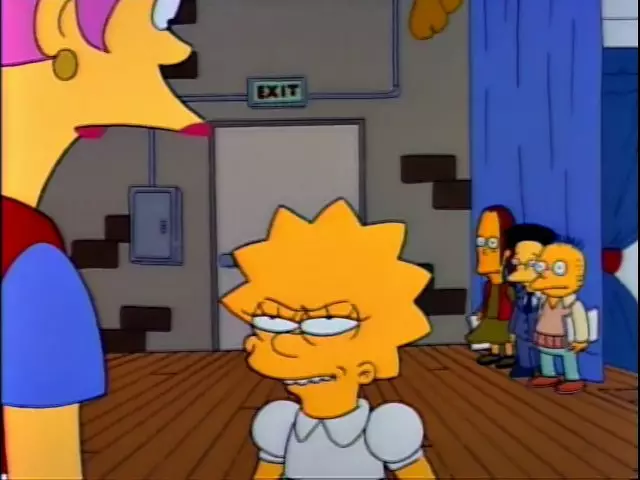My Recollection
Homer Simpsoy. First bedsies. The Deficit Rag.
His hair looked like he’d tried to kill himself with a shotgun full of Carrot Top’s pubes. His physiognomy had been shoved about by so many awkward flailing punches that he looked like one of those botched face imports for 2k19. His teeth looked like cheap aquarium gravel and none of them were on speaking terms. He had the physique of an unconscious Clayface. He was my neighbour’s dad and he looked like a quick sketch if the internet made Ronald McDonald the new body horror monstrosity.
Even in the feral tracts, a kid could think their parents infallible. One boy across the road from me believed that Aboriginals could smell blood in water, a belief he held because this fact had been delivered from his know-it-all father. The illusion is never permanent. Something breaks it. Perhaps a small moment, perhaps a break that brings much else tumbling down with it. The lucky ones get to have it fade gently until its absence is as calmly noticed as a change in the breeze.
Speaking of sub-human intelligence is an ugly thing, a dangerous thing. Dangerous because there’s simply no clean solution. Yes, some individuals are barely sapient, but there’s nothing really to be done besides make their lives comfortable. The good news is, this doesn’t take much, and based on my neighbour’s relationship with his dad, there’s no guarantee of the next generation being equally burdened. But Devlin was, without a shadow of a doubt, subhuman. Stephen was not. The naïve belief that the world worked like it said on the package was never something Stephen had to see shatter, but it turns out that watching someone roll around in the shards is equally unpleasant.
It was summer. Summer in Goodna meant melting bitumen and fighting over pedestal fans. Nobody could afford air conditioning and the resulting stickiness was a reminder of the inescapable reality of class. Poverty is fine until you can feel it pressing on your skin, and this pressure made inventors of us all. Devlin decided that the pedestal fan needed to be up higher, not itself a bad idea, but his vision called for it to be nailed to a wall. That’s it. Not put near a window or anything that may create some air flow, just nail the fucking cage to a flat wall and bingo: his family would know relief.
The pedestal was already missing, itself a weirdly common class signifier, so that was half the engineering done. All this solution needed was a nail in a wall. Devlin, in an act of honestly astonishing higher primate problem solving, pulled a straightish nail out of the outside couch. The nail he often stuck himself on. This was probably the closest he’d ever come to solving two problems at once. Now he just needed a hammer.
I walked into the house with Stephen in time to see Devlin lining up a blow with the backside of a large kitchen knife. He gripped it in a sasquatchean paw, with the point facing his towards him, and I looked to Stephen to confirm that what I thought I was about to see was what I was about to see. For a kid told not to run with sharp objects, not to cut toward himself, this was unbelievable viewing.
Stephen’s face fell. It’s the look the All-Seeing god character gets when the protagonist makes a rousing, emotional speech. I’m sorry, little one, but the universe is what it is and being able to see it is a dark burden you’ll never understand. I looked back, excited, and focused on the almost straight nail hidden among the Halloween wolfman glove that was Devlin’s other hand.
In his defence, the knife was sorta blunt, but that’s little succour to a child watching his father line up a hit by pulling a knife toward his head.
One… gotta get that line right.
Two… touch the nail a bit this time. The knife has a strangely flat handle butt, not big, but surely big enough.
Three… No, wait, not the right time just yet.
Of all the things I expected to see, I now realise that they were all foolishly focused on knife-in-head scenarios. This was always the least likely event, if for no other reason than Devlin’s head was skull all the way though.
Four.
Devlin drove the knife-butt at the nail and crushed the last knuckle of his left index finger. He roared in pain and dropped the knife, but in a way that was almost like a toss as he brought both hands up to ease the pain. The shiny thing twirled between Devlin and the wall, long enough for it to register in Devlin’s mind again. So, he caught it. His fingers wrapped around it like a crowd of Danny DeVitos swarming a food truck and clenched. He roared again. His left knuckle needed the right hand to hold it but his lightly sliced right hand needed his left hand to apply pressure. Each attempted to play its part, and so he mashed his two wounds together and roared a third time. Being thrice punished for the simple desire to have something other than the stench of stale sweat and old milk hanging on the wall was too much for Devlin, and he left the idea to storm about the house bellowing.
The fallibility of adults was known to me, but this was a surprising new form of it. Stephen watched with the idle patience of someone who’d seen this episode before.
The Episode.
Non-serialised shows still have serialised elements. There has to be some. A show can’t just be different actors playing different characters in different suburbs with different wacky neighbours every week, but different shows take different approaches. More realistic shows will undo any threatened changes before the end of the episode. This is what The Simpsons and many others do. Those less concerned with realistic presentation can skip that altogether. South Park, and Get a Life before it, openly flaunted this trope by killing characters off, only to have them alive next episode with nary a mention of the death. Each establishes an expectation set to create tone and structure narrative tension points. “How will a character escape this!?” will matter differently depending on whether their death will be recognised by the continuity.
Narrative’s start and end, and the existence of these creates the forward progress from one to another. The line between these two points is a single arc. This arc may encompass many different characters, ideas, and themes over the years, but it is still a single arc. This is an easy thing to see in a single long story, like The Odyssey but it is true even of long (58 years and counting) running series like Coronation Street. What one does in one helping the other does in pieces, but both are still a single evolving narrative world. This is the natural state of narrative, connection creates wholeness, and that whole is the single arc. A movie narrative, a single story from an anthology series like Twilight Zone, a soap like Coronation Street, even narratives with complex structures like The Wire, all have singular evolving worlds because that is the natural state of narrative.
Sitcom continuity, in spite of how common it is now and how familiar we are with it, is an aberration. It results from an external imposition twisting the narrative world, that of the need for each episode to be someone’s first. There are 8,170 episodes of the soap Neighbours, but none of these has ever reset the show’s status-quo. Events that happen, happen, and effect the narrative. Sitcoms are anomalous, as things can happen, and these happenings are necessarily narrative or character changes, but then fade, either through active reset or sitcom forgetfulness. Bart’s arc in Bart vs Thanksgiving, resulting in his heartfelt apology to his sister, would come up again if he failed to live up to it, were the series a soap. It would exist, as it would naturally, and create a changed narrative world. Instead it gets forgotten, and the unnaturalness of this creates the irreconcilable tension of a sitcom. How does someone go through all this and not change? The writers can’t write to it, and so they have to write away from it. This leads to the character degradation people refer to as Flanderisation.
It irks me that Flanders sourced the eponym, as Flanderisation is a specific form of degradation that he never underwent. For something to exist enough to need a distinct name, it itself needs to be distinct. Flanders was always a weird fundamentalist. His first late night call to Lovejoy over something trivial was in season two’s Dead Putting Society, and there is a difference between a show focusing on exaggerated traits, and an audience only having an opportunity to see traits that other parts of the show suggest the existence of. Secondly, even if it hadn’t already been alluded to, there is nothing unnatural about Flanders growing increasingly fundamental in his faith. Lastly, why single Flanders out? Why not Homer, or the show in its entirety? Flanders didn’t change in a way separate from the story world he exists in. If the world Flanderises, how does Flanders cop the blame?
A key part of the issue is that animated characters seldom age. Things like Flanders’ increasing religiosity or Lisa’s growing wokeness wouldn’t stand out as atypical developments if the characters physically developed. Growing from an intelligent child to a woke teen or very religious middle-aged man to fundamentalist coot is no great rarity, it just seems artificial when they look the same from one point to the next.
The second issue, and one that the quite good Mr Lisa Goes to Washington highlights, is the way the unpredictable serialisation of aberrant sitcom reality contributes to a sense of irregular character development. The Simpsons operates in firm enough reality that the dead stay dead, so things that linger to the credits –Maude’s death, Santa’s Little Helper, the octuplets—are obviously serialised, but character developments are entirely something else. Things like Lisa’s vegetarianism and Marge’s gambling problem pop up now and again, even if only as throwaway lines, but similar promised developments in Bart and Homer –passing the fourth grade or promising to be a better husband—don’t. Lisa’s wokeness has always come up in discussions around Flanderisation in The Simpsons, but the fact is that episodes like this one are source points for these developments. The problem is that the unpredictable serialisation teaches the audience to think otherwise.
When Lisa takes a walk to get started on her essay, she asks America to inspire her. That’s the key moment in the episode, as the nation obliges, it just doesn’t stop at seeing a bald eagle. This is an intelligent 8-year-old girl who knows how her nation works, on paper. She’s an 8-year-old girl with an idealised image of her world, and that image is shattered in about as vicious a manner as possible. A sobbing child, tearing up a love letter to her nation is a more significant character development than a declaration of vegetarianism, but it lacks the visibility or label that other serialised character moments have used to signal their persistence.
The Lisa of the first two seasons is a naïve one, a child who’s intelligent but whose intelligence lacks independence. She wants to be the best by the structures presented to her, which means being fiercely pro-American and religiously observant. She doesn’t morph into a little wokeling because the narrative can’t be bothered giving her realistic traits. She doesn’t manifest traits that don’t make sense to her character because the writers need a surrogate for their ideas. She outgrows her parents, her school, and her small little world. She has her naivety shattered by documented experience.
A 30-year-old animated sitcom is impossible to write without degeneration and Flanderisation (which, really, should be called Simpsonification). I’m sure the Lisa of season 30 is a ghastly mess, but again, that’s the show and not the character. Mr Lisa Goes to Washington isn’t an episode I think about a lot because I find the last-minute “yay ‘Murica” bullshit repugnant, but it’s another great Lisa story. In a mess of tropes, archetypes, and unnatural narrative structures, she’s something real.
Yours in waiting to be offered a bribe, Gabriel.
Jokes, Lines, and Stray Thoughts
Simpsoy still makes me giggle. These junk mail letters were what you got before spam, little has changed.
Homer’s shuddering drool of pleasure always has a note of uncomfortably visceral sexuality to it. A fact made horrifyingly clear on the odd occasion that it’s used for that.

The bank teller design is interesting in that you only see it once. A lot of these one offs got replaced as the regular cast expanded. The escalation joke with increasingly obvious reasons that the cheque isn’t worth anything is solid. Typical escalation jokes increase absurdity, but having 4 reasons at all is absurd, so these two elements work together well.
“Queers the deal” is an odd line that has come up a few times across the series.
Kind of odd use of structure to get to the main plot. The bank thing was a good joke, but the shift to the magazine feels like a narrative moment because it wasn’t brought up earlier.
First example of the meta cartoon joke. Not that great, clone Homer was better.
Homer throwing the magazine away the second he finds out competition is for kids is a good daft joke but gradually grows into a background hum of character as we see how fickle Homer can be.
“Fiercely pro-American.” This episode is a bit like Itchy and Scratchy and Marge in that its core idea is something that is fucking vile. The US is a hypocritical child-king who wails about freedom while stifling it domestically and outright overthrowing democratically elected governments internationally. The “We’re number 1” routine was a joke in the 90s, as that bloated, one-century empire began only exceeding other first world nations in things like infant mortality. Now, it’s a sickening mess, valuable only as a warning to others. The resolution of the episode, the quick cleansing of the corrupt congressman, is a particularly dark piece of irony today.
The dialogue between Marge and Lisa is a lovely moment where the jokes are internal to the scene. These are the kinds of things that get lost over time, not due to laziness, but just because they can only be repeated so much before the need for fresh humour drives them further into the absurd.
I agree with the bowl cut kid about non-voters, undecided voters are a close second.
If the US could shift some of its energy from jingoistic masturbation and direct it at, oh, fucking anything useful, it may get close to the delusional self-image it has.
The judge talking to Homer is another great escalation joke, but it’s capped off with a most perfect piece of subtlety. The slightly concerned look on the judges face during the words “your father” when she’s talking to Lisa again is great because of how much emotion it conveys in such a small gesture. It adds a darkening tone of realism to the comic buffoon, like a dash of tabasco on eggs.

“That guy has the same last name we do” is a good bit of Homeric stupidity. I’ve seen a lot of jokes about getting picked up by limo drivers like this, Beavis and Butthead Do America had another solid one, also about character stupidity.
The mid to late 19th century author Gustave Flaubert is credited with establishing a lot of the style tropes of literary realism, particularly in how he constructs a scene from cleverly arranged details. I find notes of that in sequences like the family at the Watergate. Just streams of moments that are familiar to anyone who has gone to a hotel from the airport with a twist or two for humour. Bart and the elevator. Homer and the shoehorn. The kids and first bedsies. None of it has real narrative value, but, like Moreau walking up the Latin Quarter, it adds flesh to the narrative skeleton and so produces a little more realistic a figure.
Maggie’s Washington balloon is an oddity.

Marge having a chuckle at the monument feels like a character thing that could have maintained beyond the simple joke.
Having the scene of Congressman Whateverthefuck’s bribe conversation fold straight into meeting Lisa at the end of the family’s tour day is a good way to conserve narrative space and give your narrative world neat cohesion.
Things like the above and Lisa being unable to sleep makes the wildly coincidental witnessing of the meeting feel less wildly coincidental. Most narratives have insane coincidences somewhere, the trick is in making them feel inevitable.
Abraham Lincoln wrestled, cut a mean promo, and invented the Choke Slam.
I’m a big fan of in medias res style jokes as an absurd mystery has an easier time being funnier than an absurd answer. The old guy approaching the Lincoln statue and saying, “I tried using turpentine, but that just made it worse” is a fucking killer because it: Implies he got an answer the first time. Implies the answer was something as mundane as, “Have you tried turpentine?” And creates a ridiculous mystery in the form of this problem. All this in about a 1 second line.

I talk about leaning into things a lot, and the scene with the Jefferson statue is a good example of it. The commentary track mentions some debate about whether the statue would actually talk or not, and I’m glad they went with it talking. The whole scene is wildly unreal, particularly as Lisa responds to the statue. This is really quite ridiculous, so having the statue immobile would have put all that ridiculousness onto Lisa. Is she going mad or something? The statue moving is even more ridiculous, but this leans into the concept and gives it agency that makes the scene ridiculous and not Lisa. One can overcommit, and these days it’s easier to have the absurd mesh with the realist, but this stands as a good example of how these decisions structure how scenes work.
“I get so lonely” punctuated with the bit of trash floating by is a good combo.
Yellow weasel and Black Weasel have potential parents on the steps of congress.
The run of essay judges is amusing in its specificity. Chad’s pupils never point in the same direction which is probably an animation glitch, but it suits the character and is funny.

“Booooo” Boo girl pointing out faults that can be fixed, where’s the brainless nationalism?
It’s a sign of the times that the show had to end on a note of positivity about the US political process but HAHAHAHAHAHAHAHAHAHAHAHAHAHAHAHAAAAAAAAAAAOOOoooooooooo… goddamn. The States couldn’t fix a problem if the answer to that problem was literally MORE GUNS.
Old timey paper sellers should exist again. I will hire one to loudly shout the starts of my tweets and sell printed versions of the full thing. I am not a nut.
This isn’t really an essay contest so much as it’s a public speaking contest. The Vietnamese kid’s essay is worse than Lisa’s, and that his STILL won is one of the core problems with that borderline failed state.
The tag joke is largely garbage. It’s seeded throughout the episode, but it’s a relic of the real early 90s habit of hacky tag jokes. This joke is to blame for blocking the idea that Lisa’s experiencing a significant moment of character development as she never really gets her last line. She delivers her speech, and then we get the throwaway line, “The system works”. It robs her of focus and makes the episode feel like a shaggy dog, even when it isn’t.





3 replies to Mr Lisa Goes to Washington
Magnumweight on 3rd September 201903 Sep 19 said:
My first time watching this episode I was so pissed off that Lisa didn't win the contest, and even today kind of annoys me.
Bart's hatred of the piano guy is somewhat of a surprise on rewatch, but the gag works for me.
Gabriel on 11th September 201911 Sep 19 said:
It's not that it's bad overall, just Lisa doesn't get a very meaningful conclusion to her story, a mere quip about the system working, so Bart's flippant gag kind of tilts the episode into shaggy dog territory.
Brent on 18th August 202018 Aug 20 said:
"If the US could shift some of its energy from jingoistic masturbation and direct it at, oh, fucking anything useful, it may get close to the delusional self-image it has."
Sir I fear you are vastly over-estimating how much energy that actually takes - if anything it's a thin veneer covering over the vast dearth of energy my sprawling, thinly-spread and over-extended country actually has.
Comment on Mr Lisa Goes to Washington
To reply, please Log in